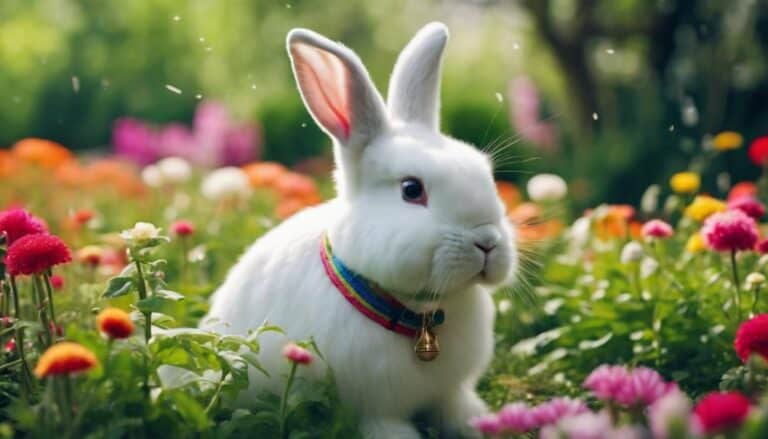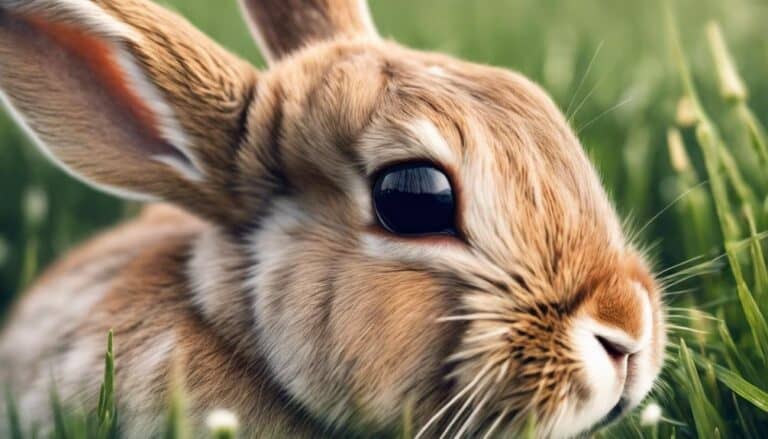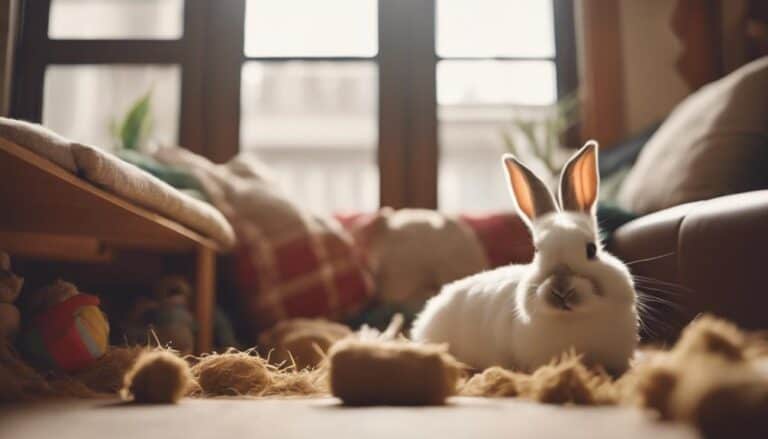Rabbits are unique animals with specific needs and behaviors. They're not like dogs or cats, so it's essential to understand their individual characteristics.
For instance, rabbits are crepuscular, meaning they're most active at dawn and dusk. They're also prey animals, so they can be easily frightened and stressed if not handled carefully.
When it comes to their diet, rabbits are herbivores and need a high-fiber diet rich in hay, veggies, and limited amounts of pellets. They also need plenty of fresh water and exercise to stay healthy.
You'll need to provide a spacious cage or enclosure that protects them from predators and gives them room to move around.
Rabbits are prone to certain health issues, such as dental problems and respiratory infections. They also need regular veterinary check-ups to stay healthy.
By knowing these basics, you can provide a safe and happy home for your rabbit and enjoy a rewarding companionship.
Contents
- 1 Key Takeaways
- 2 Lifespan of Pet Rabbits
- 3 Indoor Living Preferences
- 4 Behavioral Similarities to Wild Rabbits
- 5 High Activity Levels in Rabbits
- 6 Importance of Social Interaction
- 7 Dietary Requirements for Rabbits
- 8 Training Possibilities for Rabbits
- 9 Veterinary Care for Rabbits
- 10 Safety Precautions for Rabbit Ownership
- 11 Conclusion
Key Takeaways
So, you're thinking of bringing a rabbit into your life? That's exciting! Before you do, there are a few essential things to know.
First, you'll need to make sure your home is safe and spacious for your new furry friend. This means rabbit-proofing your space, which involves removing any hazardous materials or objects that could harm your rabbit.
Your rabbit will also need plenty of enrichment, toys, and companionship to keep them mentally stimulated. This could be anything from puzzle toys to social interaction with you or other rabbits.
When it comes to food, rabbits need a high-fiber diet rich in fresh veggies and hay. Make sure to do your research and provide a balanced diet that meets their nutritional needs.
Regular health check-ups are crucial to ensure your rabbit stays healthy. This includes spaying or neutering, as well as dental care to prevent dental problems. These may seem like small things, but they're vital for your rabbit's overall well-being.
Lastly, it's important to remember that owning a rabbit is a long-term commitment. Rabbits can live for 8-12 years, so be prepared to make a commitment to care for your rabbit for its entire life.
Lifespan of Pet Rabbits

Rabbits can live a pretty long time – up to 15 years, depending on their breed and how well you take care of them. That's a big commitment, so it's essential to think carefully before bringing a rabbit into your home.
On average, pet rabbits live for around 8 to 12 years. Some breeds can live even longer than that.
To help your rabbit live a long and healthy life, you'll need to provide them with good food, regular vet check-ups, and a safe place to live. Spaying or neutering your rabbit can also help them live longer by reducing the risk of certain health problems.
Different breeds of rabbits have different lifespans. Some are naturally longer-lived than others.
To keep your rabbit healthy and happy, you'll need to make sure they get enough exercise, mental stimulation, and social interaction. This can help them live a happy and active life well into old age.
Indoor Living Preferences
When you're thinking about keeping your rabbit indoors, one of the main things to consider is how much space they need. They require a decent amount of room to move around comfortably, so you'll need to make sure you can provide that.
To keep your rabbit safe and secure indoors, you'll need to take some steps to rabbit-proof your home. This means making sure there are no hazards or dangers that your rabbit could get into.
Another important thing to think about is keeping your rabbit stimulated and engaged. This means providing them with toys, tunnels, and other activities to keep them mentally and physically active. If you can do this, your rabbit will be happy and healthy indoors.
Indoor Space Requirements
So, you want to create the perfect indoor space for your rabbit. For your rabbit's well-being, a spacious and secure enclosure is a must. Rabbits need room to roam and feel safe, or they can get stressed and restricted.
A small enclosure isn't ideal, so you'll want to provide a decent-sized space for your rabbit to move around, stretch out, and exercise. The minimum recommended size is 2×4 feet or 8 square feet per rabbit. That way, they'll have enough room to do their thing.
It's also crucial to keep your rabbit in a safe environment. Make sure the enclosure has a solid bottom to prevent any harm to their feet and legs. And don't forget to line the enclosure with non-toxic and absorbent bedding material for their comfort.
Keep their living space clean and hygienic, too. Regular cleanings and spot cleaning will prevent the buildup of harmful substances. By creating a suitable indoor space for your rabbit, you're promoting their happiness and well-being.
Rabbit-proofing Measures
To keep your rabbit safe and happy indoors, you need to rabbit-proof your home. This means removing anything that could harm your rabbit, like electrical cords or toxic substances. You should also block off areas where your rabbit could get hurt.
The goal is to create a safe space for your furry friend to roam around. This is crucial for their well-being.
Exercise is also vital for your rabbit's health and happiness. You should aim to give your rabbit at least four hours of exercise outside of their enclosure every day. This will keep them active and healthy.
Providing a secure area for your rabbit to roam freely is essential. This will contribute to their physical and mental well-being.
Along with a balanced diet that includes rabbit pellets, a proper exercise area is necessary for your rabbit's overall health and happiness.
Enrichment and Stimulation
Rabbits are happiest and healthiest when they've plenty of space, enrichment, and stimulation indoors. They love having toys, hiding spots, and climbing structures to explore.
Setting up a playpen or rabbit-proofing your home is a must to prevent accidents.
It's also super important to introduce new enrichment activities regularly to keep your rabbit engaged and prevent boredom. Your rabbit needs enough space to move around, climb, and explore – and don't forget they need a lot of exercise, ideally at least 4 hours outside their enclosure daily.
They also need a quiet and safe space to rest and hide, like a cardboard box or a small hiding place. Rotating toys and activities will keep your rabbit entertained and help prevent destructive behavior.
Behavioral Similarities to Wild Rabbits
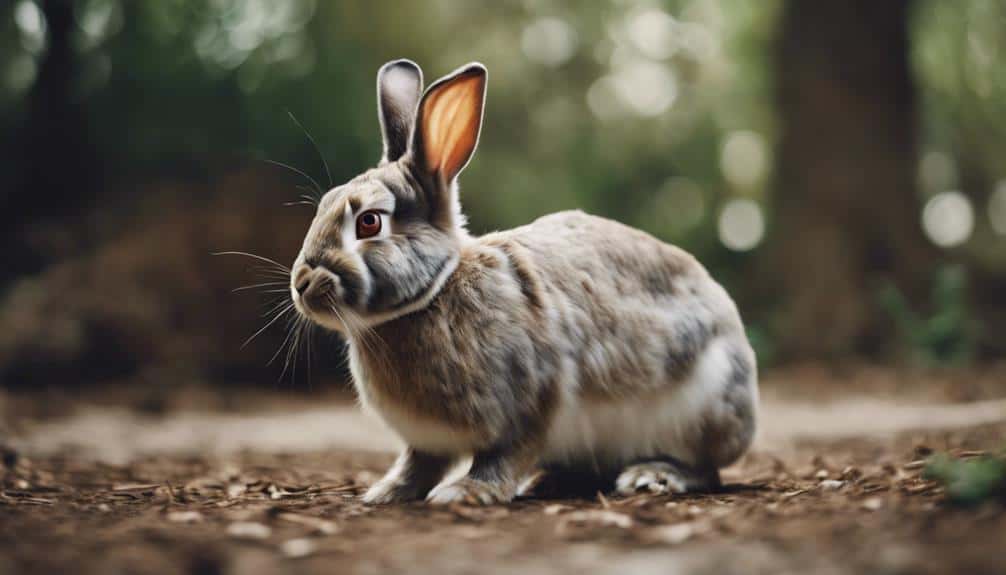
So, you've got a pet rabbit, and you've probably noticed that it does some things that wild rabbits do too. That's because, despite being domesticated, your rabbit still has some of its natural instincts kicking in.
Understanding these similarities can be really helpful in figuring out what your rabbit needs and wants. By recognizing these shared behaviors, you can create an environment that's more comfortable and nurturing for your pet.
For instance, have you ever seen your rabbit digging or burrowing? That's because wild rabbits do that too – they dig burrows to hide from predators or rest.
So, if you provide your pet rabbit with some space to dig, it'll be exercising a natural behavior.
Or maybe you've caught your rabbit thumping its hind legs when it's scared or senses danger. Wild rabbits do the same thing – it's a warning signal to other rabbits in the area.
By understanding these behaviors, you can better respond to your rabbit's needs and provide it with a sense of security.
Wild Rabbit Behaviors
When you understand how wild rabbits behave, you can learn a lot about your pet rabbit's instincts and needs.
In many ways, domestic rabbits are similar to their wild cousins. For example, rabbits have sensitive digestive systems that need a diet high in fiber, like hay and leafy greens. If you mimic the diet of wild rabbits by feeding your pet lots of fiber, you can help prevent health problems like gastrointestinal stasis.
Wild rabbits are always on the go, searching for food and avoiding predators. This means your pet rabbit needs daily exercise to stay healthy and happy. If your rabbit doesn't get enough physical activity, it can lead to obesity and other health issues.
In the wild, rabbits live in cool burrows, which means they're prone to heat stroke in hot environments. So, as a responsible rabbit owner, you need to provide a cool and shaded space for your pet to prevent heat-related problems. By understanding how wild rabbits behave, you can create a great environment for your domestic rabbit's overall well-being.
Domestic Rabbit Tendencies
To better care for your pet rabbit, it's essential to understand their natural behaviors and instincts. You see, domestic rabbits are a lot like their wild counterparts, and recognizing these similarities can give you valuable insights into their needs.
For instance, pet rabbits need daily exercise to stay healthy and happy, just like their wild relatives. They also require attention and social interaction to prevent boredom and depression. Regular health exams are vital for maintaining their well-being, especially since they're adoptable animals that may have specific medical needs.
One crucial thing to keep in mind is that a rabbit's teeth grow constantly. This means they need access to items for chewing to prevent overgrowth and dental issues. Spaying and neutering your rabbit is also important, not only to control the pet population but also to reduce the risk of certain health problems. And, providing grass hay in their diet is essential for proper digestion and maintaining dental health.
Here's a breakdown of some key rabbit behaviors and why they're important:
Rabbit Behavior | Importance
———————– |—————————————————————————-
Need Daily Exercise | Helps maintain physical health and mental stimulation
Health Exams | Vital for maintaining overall well-being and early detection of any medical issues
Teeth Grow Constantly | Requires proper chewing materials to prevent dental problems
Spaying and Neutering | Controls pet population and reduces the risk of certain health problems
High Activity Levels in Rabbits
Rabbits need to get moving to stay healthy and happy. They require at least four hours of exercise every day to burn off energy and stay active. To make this happen, you'll need to provide a spacious area where they can roam freely, run, jump, and play. A good rule of thumb is to create a playpen or rabbit-proof a room that's three to four times their full length and tall enough for them to stand on their hind legs.
In this space, offer them safe chew options like cardboard boxes and toys. This will redirect their natural instinct to chew and prevent them from damaging hazardous items like electrical cords and furniture.
When your rabbit is playing, it's crucial to supervise them. This ensures their safety and prevents unwanted chewing behaviors.
Regular exercise is vital for maintaining their overall health, both physically and mentally. It prevents obesity and related health issues, while keeping them stimulated and engaged.
To keep things interesting, mix up their routine by hiding treats and toys. This will keep them happy, satisfied, and mentally active.
Importance of Social Interaction
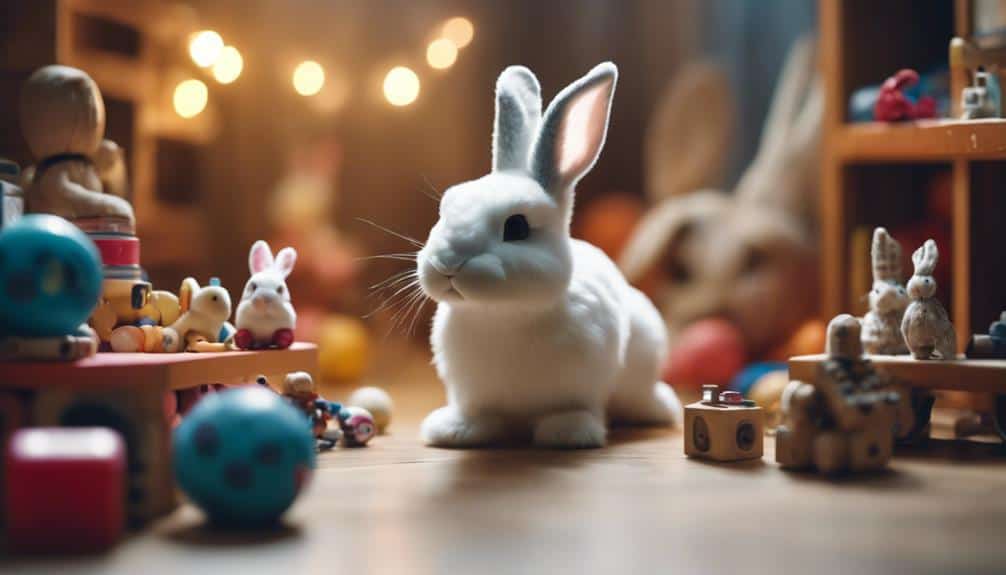
Social interaction is essential for the well-being of rabbits because they're social animals that require attention and companionship to thrive. When you own a rabbit, it's crucial to understand the importance of socialization for their happiness and health.
So, why is social interaction so vital for your rabbit? For starters, they need daily interaction to feel happy and content. Whether it's playtime or simply hanging out with them, your rabbit needs you to be present in their life. This daily interaction can prevent feelings of loneliness, boredom, and depression.
One great way to interact with your rabbit is to do quiet activities together, like reading or watching TV. This can help them get used to human interaction and feel more comfortable around you.
You can also try training your rabbit to do tricks, like coming when called, or engaging them in mental enrichment activities, such as hiding treats. These activities keep their minds stimulated and happy.
Dietary Requirements for Rabbits
Rabbits need a high-fiber diet that's rich in grass hay and fresh veggies. In fact, grass hay like Timothy hay should make up most of what they eat. You should give them unlimited access to it.
Fresh veggies are also a must. Dark leafy greens like kale, spinach, and collard greens are great options. You can give them these daily. Carrots and fruits are okay too, but only as occasional treats.
Rabbit pellets should be limited because they can cause obesity and health problems if eaten too much.
Rabbits have super sensitive digestive systems. So, you need to introduce new foods slowly to prevent digestive issues. A good rule of thumb is to add one new food item every 7-10 days.
And don't forget to make sure they always have fresh water available. Change the water daily to keep it clean and prevent bacterial growth.
If you follow these simple dietary guidelines, you'll be helping to prevent health problems and keeping your rabbit happy and healthy.
Training Possibilities for Rabbits
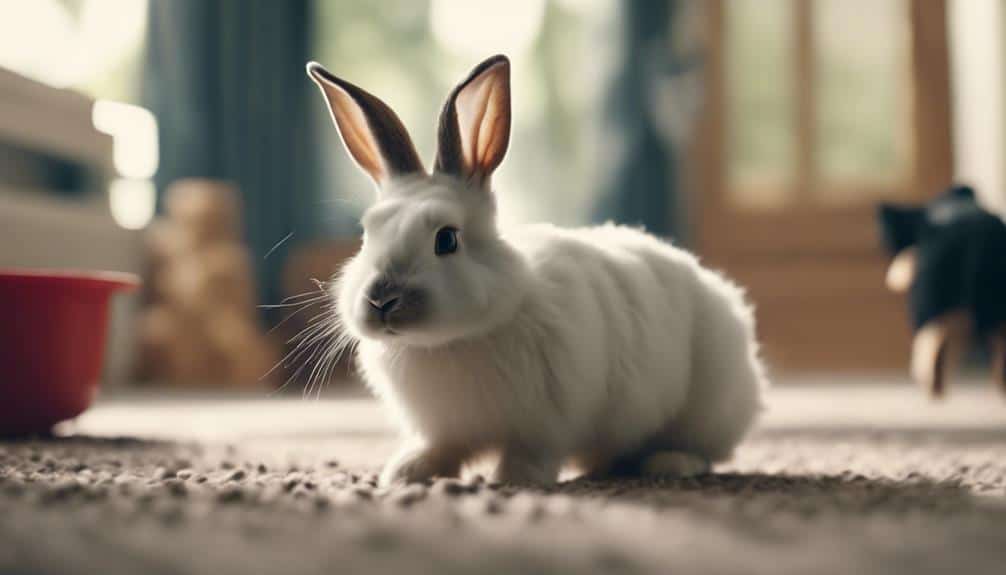
Training your rabbit can be a fun and enriching experience for both you and your furry friend. Rabbits are smart animals and can learn to do all sorts of things.
One cool thing you can teach your rabbit is to use a litter box, just like a cat. To do this, try putting some hay near the litter box – this will encourage your rabbit to use it.
When you're introducing your rabbit to new places or other pets, it's a good idea to start on neutral ground. This means meeting in a place where neither of them feels territorial or stressed. This can help them get along better.
Rabbits need exercise to stay healthy and happy, so make sure you give them a safe space to run around and explore every day.
If you think your rabbit might get lonely, you could consider getting them a pet friend to keep them company. Just remember to introduce them slowly and supervise them at first to make sure they get along.
The key to training your rabbit is to be patient, consistent, and positive. With a little effort, you can teach your rabbit all sorts of things and make your bond with them even stronger. Plus, it's great for their overall well-being!
Veterinary Care for Rabbits
When you own a rabbit, getting the right veterinary care is crucial for keeping your furry friend healthy and happy. Rabbits need regular health checks with a vet who's experienced in caring for small mammals like rabbits.
These check-ups are vital for catching health issues early on.
Dental problems, tummy troubles, and respiratory infections are common issues in rabbits. But the good news is that regular vet visits can help prevent and address these problems.
Your vet will also let you know about any necessary vaccinations, like the Myxomatosis and Calicivirus vaccines, which protect rabbits from deadly diseases.
Spaying or neutering your rabbit is also a good idea.
It can prevent health issues like uterine cancer and behavioral problems like aggression and spraying.
If an emergency comes up, it's essential to have your vet's contact info handy.
Rabbits can go downhill fast, so quick vet care is critical for their health and well-being.
Safety Precautions for Rabbit Ownership
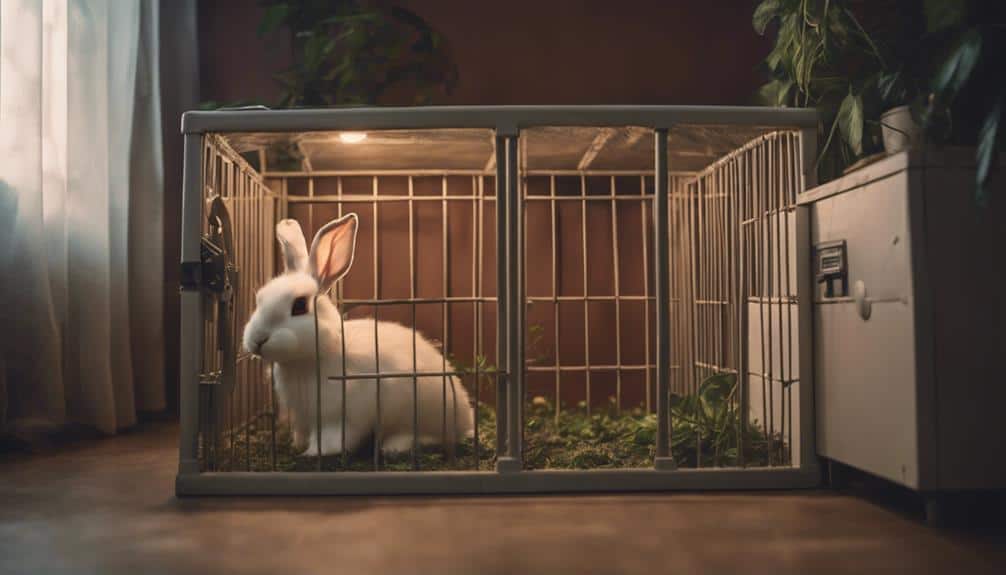
To keep your rabbit safe and healthy, you need to take some important precautions. Rabbits are active and need space to move around, so it's crucial to create a safe environment for them.
First, make sure their living space is free from anything they could chew on. Rabbits' teeth grow continuously, and if they're not worn down naturally, they can become overgrown, leading to serious health issues. So, remove any hazardous items that could harm your rabbit.
Next, monitor what your rabbit eats. They need a diet rich in hay and fresh veggies daily. Avoid giving them foods that can harm their digestive system – it's better to be safe than sorry!
Rabbits are naturally curious, so you need to limit their access to areas that could put them in danger. Block off any areas where they could get stuck or injured. It's always better to err on the side of caution when it comes to your rabbit's safety.
Conclusion
Now that you know the basics of caring for a rabbit, you can look forward to a happy and fulfilling relationship with your pet.
First and foremost, your rabbit needs a safe environment to thrive. This means providing a spacious cage or enclosure that protects them from harm and prevents escape.
A proper diet is also crucial. Rabbits are herbivores and need a high-fiber diet rich in hay, vegetables, and limited amounts of pellets. Fresh water should always be available.
Rabbits are social creatures and need interaction. Spend time with your rabbit daily, letting them out of their cage to exercise and play.
Regular veterinary check-ups are essential to ensure your rabbit stays healthy. Look for signs of illness and consult with a vet experienced in caring for rabbits if you have any concerns.


